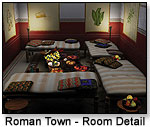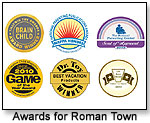
April 10, 2025

August 2011 | Vol. X - No. 8
Q&A with Suzi Wilczynski, Founder of Dig-It! Games
Computer Game "Roman Town" is Educating Kids one Dig at a Time
TDmonthly recently had a chance to speak with Suzi Wilczynski, creator of the computer game "Roman Town" and founder of Dig-It! Games, whose product not only seeks to entertain and educate all who play, but also to interest more young girls in science and computer technology.
Below, Suzi tells us how allowing kids to see the real world application of subjects like math and science encourage their interest in those fields, all the while keeping in mind that "the biggest challenge is creating a game that is actually fun!"
Q. On your website it says, "Suzi was dissatisfied with the options to bring archaeology into the classroom and decided to develop a product that made it fun and easy to teach archaeology." Unlike a lot of toy and game designers who can make their products out of materials they have lying around their house, Roman Town is a computer game. Who did you work with to develop the software, and was that process like?
A. I actually started with a computer game, because archaeology is studied in three dimensions and it needs to be addressed that way, and needs to be taught that way…something I could have made with materials just lying around my office wouldn’t address how archaeologists actually work. The process for developing the game was pretty straightforward. We found a software developer, and it was a very integrative process where we tweaked the game until we got exactly what we wanted, so it could teach exactly what it was I wanted it to teach.
 Q. How much research went into creating the game, in terms of the accuracy of the artifacts, etc, that can be found in ancient Rome? Did you do the research yourself, or work with other archaeologists?
Q. How much research went into creating the game, in terms of the accuracy of the artifacts, etc, that can be found in ancient Rome? Did you do the research yourself, or work with other archaeologists?
A. Roman Town is based largely on my experiences as an excavator and a Mediterranean archaeologist. I based it on my knowledge of roman history and excavation. I did a lot of research on Roman daily life for the game. I really wanted the artifacts to be digitally accurate, so a lot of research went into finding visual representation of the artifacts for the artists to work with. All of the information is historically accurate; I’m actually an archaeologist, so one of the values of the game is you know all the information is correct.
Q. When did you first conceptualize Roman Town?
A. The very first idea came out of a classroom project I did with a colleague of mine when I was in school. It was something that had always been in the back of my mind, and when I found that I couldn’t find a teaching tool that was any better than the project I had done, I knew that I had to create something that would combine the technology aspect of archaeology with learning.
Q. Why is it important for kids to learn about ancient Rome? Archaeology?
A. Kids should know about ancient Rome for the reason we teach history in general- we need to be able to understand our past to understand our future. It’s important for American students especially, and European students to an extent, because ancient Rome is where our culture comes from- their art, education, food, government, all have influenced everything in our lives.
I think kids should learn about archaeology because I believe what it does is it allows students to use all of the skills they use in school- English, science, math, history- and combines them in a way that is fun and develops critical thinking and logic skills. It’s a tool that gets kids interested in whatever topic attracts them. They see that math has a real application in the real world; history isn’t as boring as it is taught in school. And they learn about archaeology as a science in itself.
Q. How long did it take to bring Roman Town from and idea to a product that could actually be sold?
A. Approximately 4 years- the majority of time was spent testing and refining the game play.
 Q. On your website, there is an interview where you talk about "encouraging young girls to get involved in non-traditional fields like archaeology and technology." Did you specifically create the game with this in mind?
Q. On your website, there is an interview where you talk about "encouraging young girls to get involved in non-traditional fields like archaeology and technology." Did you specifically create the game with this in mind?
A. I did; I have chosen two professions that are not traditional paths for women, and I don’t understand why more girls don’t go into science and computer technology fields. I think it’s important to teach them at a younger age that it’s not intimidating. I made the game and did specifically think to attract young girls, who are non-traditional gamers (unlike boys, who are gamers and will play just about anything as long as it’s fun), so the game design took that into account. And it has been successful- I get letters from parents saying their girls love this game, and are now interested in history or science, or whatever element appealed to them.
Q. What has been the response to Roman Town? Have you seen the most interest from educators, parents who home school, or general consumers?
A. The response has been fantastic. We’ve had no negative reviews. It really does appeal across a broad spectrum, parents and homeschoolers. Because of funding issues getting it into the classroom is a struggle, but [teachers] want it.
Q. Have you always been interested in Archaeology? What did you go to school for?
A. I always had an interest in ancient history, but I didn’t realize one could be an archaeologist until I went to college. I went to school for my BA in Classical Archaeology, and my Masters in Mediterranean archaeology. I also have a long time interest in computer games and technology; it was something that interested me in middle school and high school as well.
Q. What advice would you give to someone who wants to create a computer game? What are the biggest challenges?
A. The biggest challenge is creating a game that is actually fun… many computer games are not! But as far as advice goes- read as much as you can about how one designs computer games, and play a lot of games, even if they’re not in your genre. You need to play games to understand games.
My goal in creating Roman Town was to create something that is educational and fun, which I think is a challenge, but I believe we have been successful.
You can learn more about Roman Town and Dig-It! Games below.
Roman Town: The Premiere Archaeology Computer Game for Kids by DIG-IT! GAMES
 Roman Town lets the player be an archaeologist and manage a team of diggers while learning about archaeological techniques and uncovering ancient objects. Graphics rendered in 3D let players explore Roman buildings and immerse themselves in Roman history. One can put pots together, exercise puzzle skills with fun mini-games, and find out what archaeologists really do. President of Dig-It Games Suzi Wilczynski told TDmonthly, "Roman Town is unique, educational and, most importantly, lots of fun!"
Roman Town lets the player be an archaeologist and manage a team of diggers while learning about archaeological techniques and uncovering ancient objects. Graphics rendered in 3D let players explore Roman buildings and immerse themselves in Roman history. One can put pots together, exercise puzzle skills with fun mini-games, and find out what archaeologists really do. President of Dig-It Games Suzi Wilczynski told TDmonthly, "Roman Town is unique, educational and, most importantly, lots of fun!"
Awards: The Tillywig Brain Child Award; NAPPA Honors; The National Parenting Center 2010 Seal of Approval; Creative Child 2010 Game of the Year Award; Dr Toy’s Best Vacation Product; five 2010 Life Buzz Parent-to-Parent awards. ( Watch Video) 4/29/2010 (MSRP: $39.95; Age: 8 and Up)
Watch Video) 4/29/2010 (MSRP: $39.95; Age: 8 and Up)
Copyright © 2025 TDmonthly®, a division of TOYDIRECTORY.com®,
Inc.



 Q. How much research went into creating the game, in terms of the accuracy of the artifacts, etc, that can be found in ancient Rome? Did you do the research yourself, or work with other archaeologists?
Q. How much research went into creating the game, in terms of the accuracy of the artifacts, etc, that can be found in ancient Rome? Did you do the research yourself, or work with other archaeologists? Q. On your website, there is an interview where you talk about "encouraging young girls to get involved in non-traditional fields like archaeology and technology." Did you specifically create the game with this in mind?
Q. On your website, there is an interview where you talk about "encouraging young girls to get involved in non-traditional fields like archaeology and technology." Did you specifically create the game with this in mind?  Roman Town lets the player be an archaeologist and manage a team of diggers while learning about archaeological techniques and uncovering ancient objects. Graphics rendered in 3D let players explore Roman buildings and immerse themselves in Roman history. One can put pots together, exercise puzzle skills with fun mini-games, and find out what archaeologists really do. President of Dig-It Games Suzi Wilczynski told TDmonthly, "Roman Town is unique, educational and, most importantly, lots of fun!"
Roman Town lets the player be an archaeologist and manage a team of diggers while learning about archaeological techniques and uncovering ancient objects. Graphics rendered in 3D let players explore Roman buildings and immerse themselves in Roman history. One can put pots together, exercise puzzle skills with fun mini-games, and find out what archaeologists really do. President of Dig-It Games Suzi Wilczynski told TDmonthly, "Roman Town is unique, educational and, most importantly, lots of fun!"![]() Watch Video) 4/29/2010 (MSRP: $39.95; Age: 8 and Up)
Watch Video) 4/29/2010 (MSRP: $39.95; Age: 8 and Up)